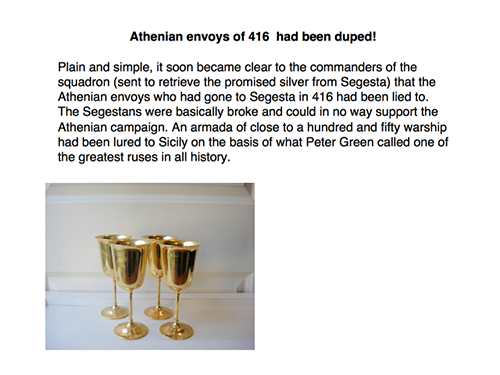












Below is Thomas Hobbes’ translation of Thuc. 6.46:
But the Segestaeans, when the first ambassadors from Athens went to see their treasure, had thus deceived them. They brought them into the temple of Venus in Eryx and showed them the holy treasure, goblets, flagons, censers, and other furniture, in no small quantity; which being but silver, appeared to the eye a great deal above their true value in money. Then they feasted such as came with them in their private houses, and at those feastings exhibited all the gold and silver vessels they could get together, either in the city of Segesta itself, or could borrow in other as well Phoenician as Grecian cities, for their own. So all of them in a manner making use of the same plate, and much appearing in every of those houses, it put those which came with the ambassadors into a very great admiration, insomuch as at their return to Athens they strove who should first proclaim what wealth they had seen.
Benjamin Jowett’s translation of part of Thuc. 6.46 follows:
They also privately entertained the ships' crews, and collected all the cups of gold and silver that they could find in Segesta itself or could borrow in the neighboring Phoenician and Hellenic towns, and each brought them to the banquets as their own; [4] and as all used pretty nearly the same, and everywhere a great quantity of plate was shown, the effect was most dazzling upon the Athenian sailors, and made them talk loudly of the riches they had seen when they got back to Athens. (Thuc. 6.46)